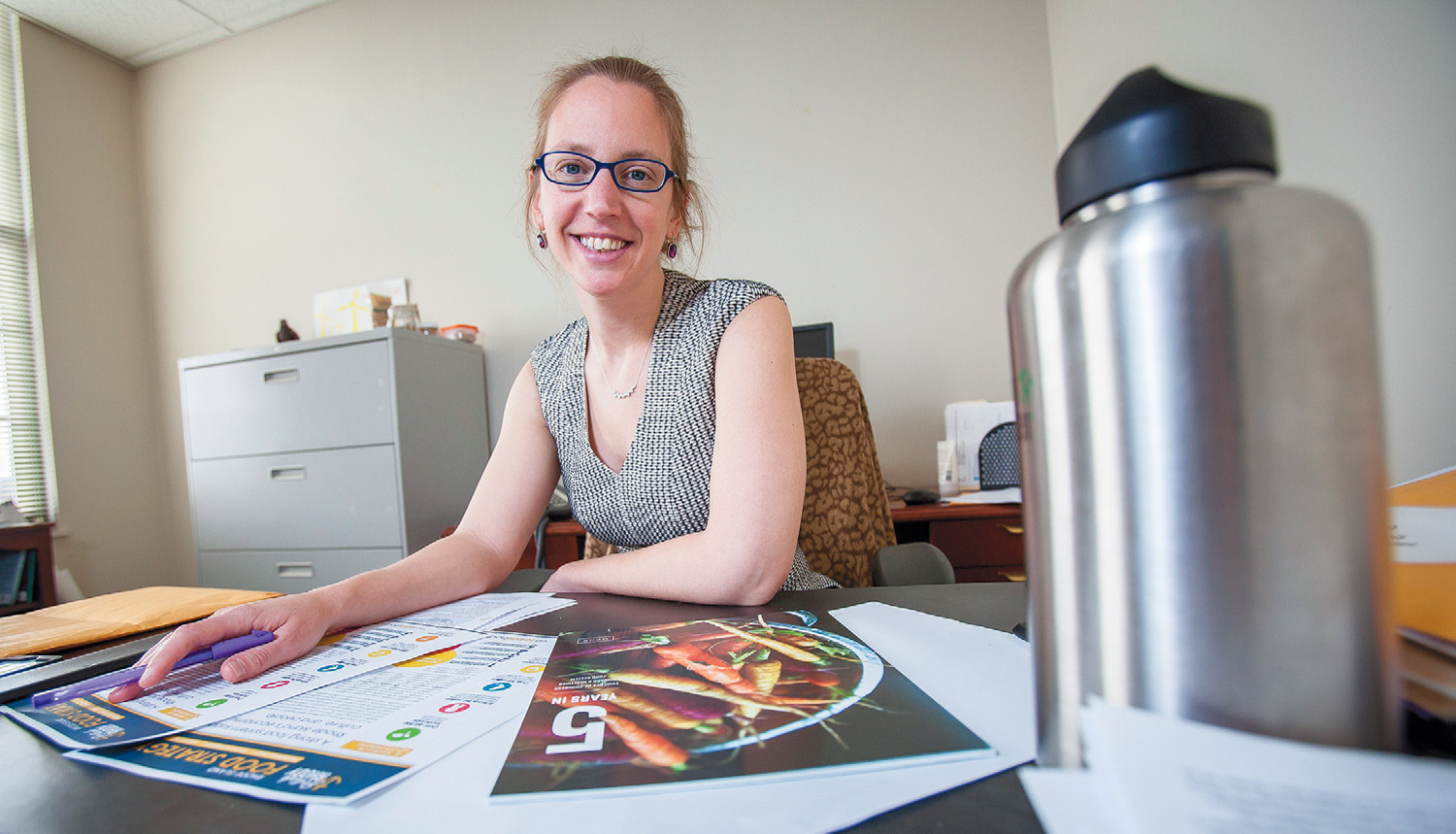Director of Food Strategy Sue AnderBois
Growing a Plan for Rhode Island’s First Statewide Five-Year Food Strategy
In a state more accustomed to being near the last on many fronts, we have an important first: a governor-appointed director of food strategy, the job that Sue AnderBois has held since June 2016. Brimming with enthusiasm and energy for her new role, AnderBois collaborates across Rhode Island agencies including the Department of Environmental Management (DEM), the Department of Health and the Commerce Corporation, to build a stronger food system for all Rhode Islanders. Edible Rhody recently sat down with the New-Jersey-native-turned-ardent-Rhode-Islander to learn more about her task to develop a five-year food strategy for our state.
Q: What is a food system? And what are Rhode Island’s biggest challenges to building a healthy one?
A: A food system is all the different components of getting food to people—from growing, harvesting, capturing and processing food, distributing it to people’s homes, restaurants and grocery stores to what happens next: Is food waste composted, diverted to a food bank or trashed? In short, it’s about who has access to food and how do they interact with it.
Our food system faces several key challenges. Food insecurity is a multifaceted problem, the root of which is poverty. In addition, our transportation systems must improve to be able to connect people to the food they need. Independent stores [such as the bodegas in neighborhoods where large grocery stores are scarce] must carry healthy food.
Rhode Islanders across varied socio-economic levels need to learn general cooking skills and how to prepare products from local farmers’ markets and waterways. Finally, affordable farmland and environmentally appropriate, cost-efficient wastewater treatment systems are both in short supply.
Q: What are the key components of our food strategy?
A: Our food strategy provides a framework for how we talk about food and how we grow and support our food system. Its three key components are food production (farms and fisheries); health and access; and economic development. Based on these components, we have five recommendations: alleviate food insecurity and hunger; make food production more accessible; create, sustain and grow markets for local products; prioritize environmental and economic sustainability; and create and sustain the [economic] climate for Rhode Island’s food businesses.
Q: What are the short-term goals of implementing the food strategy?
A: We want to get a lot of public engagement and stakeholder involvement with the creation of the strategy and “buy-in” around the strategy’s recommendations and vision, and we were successful in getting broad-based feedback. In partnership with the Rhode Island Food Policy Council, we’re hosting several targeted and public outreach events to workshop the draft. We plan to release the strategy’s final version in May, and we hope other food sector organizations and stakeholders will endorse it. (Read the draft of the Food Strategy plan at RelishRhody.com.)
Q: And the long-range goals?
A: Creating and building toward this vision of a Rhode Island food system that supports our economy and our culture and our people—that’s what we hope to accomplish during this five-year plan. We’ve created this climate, streamlined regulations and provided better coordination of information about financing, job training programs, etc., but some regulations could be reformed to better support the food system. Regulations limiting the sales of ice cream and fresh fish are just two examples, and food safety manager training regulations are being revised to be consistent with those in Massachusetts and Connecticut.
Another long-range goal is for Rhode Island to meet the New England Food Vision: Can New England produce 50% of its food by 2060? This vision, which Rhode Island adopted last year, came from Food Solutions New England, a regional nonprofit organization. Currently, only 10% of the food New Englanders eat is produced in New England.
Q: How might ordinary Rhode Islanders help improve Rhode Island’s food system and support the goals of your food strategy?
A: Shop local! Find farmers’ markets, supermarkets and independent markets that carry products raised, caught and produced in Rhode Island—and buy them. Those dollars stay in Rhode Island and support its food system. Learn more about food insecurity and how you can help alleviate it. One in every eight households here is food insecure. You can donate to the Rhode Island Community Food Bank or get involved in one of many meal sites or food pantries to help feed your neighbors.
Finally, if you have a dream of starting your own food business, don’t be intimidated; do something about it. Rhode Island is a great place to start a food business.
Q: Why was Rhode Island the first to hire someone to direct food strategy and policy on a statewide basis?
A: I praise Governor Raimondo for recognizing that this is a strategic area for [business development in] Rhode Island and for doing something innovative by creating this position. We have an amazing food history and culture here, and it’s who we are as a people. This didn’t happen in a vacuum; a great deal of food-related work has occurred in the last several years. The DEM has been working on farmland protection and building an infrastructure for direct retail sales from farmers’ markets. The Food Policy Council, which began in 2011, has coordinated food development, and funders such as the Kendall Foundation support our work. There are many other organizations, agencies and individuals that have also been a part of the growth thus far as well. Together, we can move Rhode Island’s food system forward in a positive and sustaining direction.
For more information about Rhode Island’s Food Strategy and ways you can get involved, visit RelishRhody.com.





